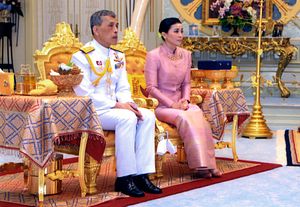More than two months after Thais went to the polls, the country is still struggling to resolve its long drawn out political crisis. Some Thais were hopeful that the elections might resolve the political deadlock that has caused so much damage to the country. But it’s now evident that that hope has been shattered and that the electoral process has once again failed to extricate Thailand from a precarious situation.
On June 6, the Thai parliament voted to keep General Prayut Chan-o-cha as premier, mainly due to the support of junta-appointed senators and some pro-junta political parties. Thailand will live with Prayut for the next four years. Meanwhile, the party endorsed by former Prime Minister Thaksin Shinawatra, Pheu Thai, will play an opposition role for the first time.
To understand the current political instability in the country, one has to start to understand the deep political divides in Thai society and also in politics. In less than eight years, two coups — the first in 2006 against Thaksin and the second in 2014 against his sister Yingluck — effectively put on hold the democratization process that was enthusiastically promoted a decade earlier, but which failed to integrate the different political constituencies in Thailand.
But the two coups had different objectives. In 2006, Thaksin was overthrown because he posed a serious threat to the political domination of the monarchy, whose power has been sustained by the military. In 2014, the ousting of Yingluck had more to do with protecting and shoring up the power of the monarchy in preparation for the imminent royal succession.
King Bhumibol Adulyadej was crowned in 1946. He passed away in October 2016, ending 70 years of authoritative reign, which competed fiercely against, and won over, a series of civilian governments. By 2014, Bhumibol was bedridden. Indeed, he had been in and out of the hospital since 2009. The king’s deteriorating health sparked a sense of anxiety among Thai royalists, who had invested tremendously in Bhumibol over the decades, hoping to use the monarch as an instrument to defend their political interests.
The anxiety drove the military to stage a coup against Yingluck, who was seen as a political puppet of her brother. The military feared that a Thaksin-influenced government during the crucial royal transition would jeopardize the power interests of the monarchy and, in particular, the military itself. The military elite saw the political conflict as a zero-sum game: they either took all or lost all to Thaksin.
Vajiralongkorn, the current king, is starkly different from his father. Reigning the nation based on a moral authority, Bhumibol gained immense reverence and respect from most Thais. He embarked on a lifelong project to place the monarchy on top of the political structure — a mission that he successfully accomplished.
Vajiralongkorn is not loved. He has earned a reputation as a philanderer, owing in part to his eccentric lifestyle. Some cases have revealed a violent side to the king, and he is reported to punish his staff. In 2015, for example, three of his confidants were found guilty of corruption and imprisoned. Shortly after that, they died mysteriously while in detention.
In the political realm, Vajiralongkorn has proved wrong some analysts who had thought he would be a weak king, especially as compared to his able father. The reality is that even before Bhumibol’s death, Vajiralongkorn had taken control of royal affairs, reorganizing the palace and replacing his father’s cronies with his own trusted men. He intervened in the writing of the constitution, requesting that provisions related to the monarchy be amended. Those changes allow him to live in Germany without having to appoint a regent, so that he can rule Thailand from his luxurious mansion on the outskirts of Munich.
He also took control of the super-rich Crown Property Bureau, inheriting an enormous sum of $30 billion from his father. The bureau is an investment arm of the monarchy, and for years, Bhumibol didn’t want to discuss its ownership. Vajiralongkorn has been more open, admitting that he, not the royal institution, now owns the wealthy organization.
Vajiralongkorn is eager to strengthen his ties with the military to guarantee the stability of his throne. Military strongmen who were influential in the Bhumibol era — like General Prem Tinsulanonda, a former army chief, former prime minister, and past president of the Privy Council — have died or faded into the shadows. Vajiralongkorn has moved away from the old links in the army and built new relationships with younger cliques in the military.
As a case in point, he handpicked General Apirat Kongsompong to serve as the army chief. On his first day in the job, Apirat reaffirmed his loyalty to the monarchy by threatening to stage a coup if the political crisis didn’t subside.
The new monarchy-military alliance is a worrying sign for Thai democracy. It is also a sign of the emergence of a politically active king, despite the stipulation in the constitution that the monarchy is supposed to stay above politics.
The road toward political stability for Thailand is long and uncertain. The recent elections clearly didn’t stabilize the political landscape. If anything, they gave a confidence to the military and monarchy that they, at the end of the day, could control electoral mechanisms even at the expense of further undermining the country’s democracy. How exactly they will go about this, and how forces against them will react, leaves the country’s future in deep uncertainty.
Pavin Chachavalpongpun is associate professor at Kyoto University’s Center for Southeast Asian Studies.

































